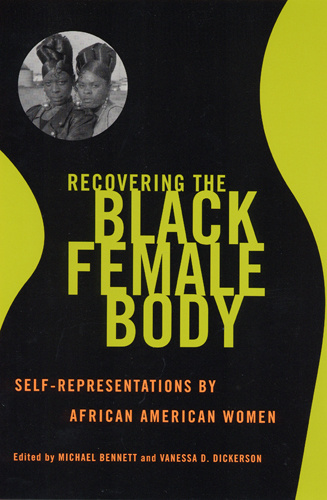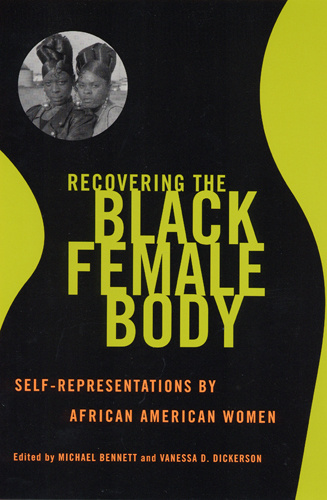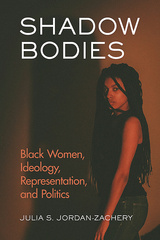Recovering the Black Female Body
Self-Representation by African American Women
Despite the recent flood of scholarly work investigating the interrelated issues of race, gender, and representation, little has been written about black women’s depictions of their own bodies. Both past and present-day American cultural discourse has attempted either to hypereroticize the black female body or make it a site of impropriety and crime.
The essays in this volume focus on how African American women, from the nineteenth century to the present, have represented their physical selves in opposition to the distorted vision of others. Contributors attempt to “recover” the black female body in two ways: they explore how dominant historical images have mediated black female identity, and they analyze how black women have resisted often demeaning popular cultural perceptions in favor of more diverse, subtle presentations of self.
The pieces in this book—all of them published here for the first time—address a wide range of topics, from antebellum American poetry to nineteenth-century African American actors, and twentieth-century pulp fiction.
Recovering the Black Female Body recognizes the pressing need to highlight through scholarship the vibrant energy of African American women’s attempts to wrest control of the physical and symbolic construction of their bodies away from the distortions of others.
Contributors are Margaret Bass, Dorri Rabung Beam, Michael Bennett, Jacqueline E. Brady, Daphne A. Brooks, Vanessa D. Dickerson, Meredith Goldsmith, Yvette Louis, Ajuan Maria Mance, Noliwe Rooks, Mark Winokur, and Doris Witt. This book also contains a foreword by Carla L. Peterson and an afterword by Deborah E. McDowell.
Although feminists have studied the social construction of the female body for many decades, few have focused on black women. In Recovering the Black Female Body, the editors present a pioneering collection of original writings by academics and artists on æhow African-American women, from slavery to the present, have represented their physical selves in opposition to the distorted vision of the dominant culture.Æ.
A collection of essays that examine the complex workings of race, gender and the body. Editors Bennett and Dickerson explain that it seeks to æamplifyÆ African American women writersÆ attempts to ætake back their selves and reappropriate and reconstitute a body that has often been hyperoticized or exoticized and made a site of impropriety and crime.Æ.
By examining African American women writers of the nineteenth and twentieth centuries, the book not only makes a significant contribution to a body of scholarly work but also attempts to ærecoverÆ a more accurate representation of the African American female body.
A highly original and very informative collection of essays that theorizes the complicated intersection of the black female body and its Western symbolic meanings. The collection is essential for anyone interested in the tensions between post-structuralist and humanist understandings of subject formation, social agency, and performative identity.
Bennett is Assistant Professor of English at Long Island University.
Vanessa D. Dickerson is a professor of English at DePauw University and the author of Victorian Ghosts in the Noontide: Women Writers and the Supernatural.
Michael Bennett, M.D., educated at both Harvard College and Harvard Medical School, is a board-certified psychiatrist, Canadian, and Red Sox fan. He has a private practice which he's been running for almost thirty years. Michael lives with his wife in Boston.
Daphne Brooks is Assistant Professor in the Department of English and African-American Studies at Princeton University, where she teaches courses on African-American literature and culture, performance studies, critical gender studies, and popular music culture.
Dorri Beam is Assistant Professor of English at the University of California, Berkeley.
MEREDITH GOLDSMITH is Assistant Professor of English at Whitman College. She lives in Walla Walla, Washington.
Winokur teaches film, popular culture, and American literature at the University of Colorado at Boulder.
Deborah E. McDowell (Ph.D. Purdue), Co-Editor, Realism, Naturalism, Modernism. Alice Griffin Professor of English, University of Virginia. Founding editor of the Beacon Black Women Writers series; co-editor with Arnold Rampersad of Slavery of the Literary Imagination; author of "The Changing Same: Studies in Fiction by Black Women; Leaving the Pipe Shop: Memories of Kin; editor of Nella Larsen's Quicksand and Passing, Jessie Redmon Fauset's Plum Bun, Pauline Hopkins s Of One Blood, and numerous articles and essays.
"The deeds done in my body": black feminist theory, performance, and the truth about Adah Isaacs Menken / Daphne A. Brooks
The flower of Black female sexuality in Pauline Hopkins's Winona / Dorri Rabung Beam
Shopping to pass, passing to shop: bodily self-fashioning in the fiction of Nella Larsen / Meredith Goldsmith
Re-locating the Black female subject: the landscape of the body in the poems of Lucille Clifton / Ajuan Maria Mance
Body language: the Black female body and the word in Suzan-Lori Park's The death of the last Black man in the whole entire world / Yvette Louis
Detecting bodies: Barbara Neely's domestic sleuth and the trope of the (in)visible woman / Doris Witt
Summoning somebody: the flesh made word in Toni Morrison's fiction / Vanessa D. Dickerson
On being a fat black girl in a fat-hating culture / Margaret K. Bass
Body and soul: identifying (with) the Black lesbian body in Cheryl Dunye's Watermelon woman / Mark Winokur
Pumping iron with resistance: Carla Dunlap's Victorious body / Jacqueline E. Brady
Wearing your race wrong: hair, drama, and a politics of representation for African American women at play on a battlefield / Noliwe Rooks (photographs by Bill Gaskins)
Afterword: recovery missions: imaging the body ideals / Deborah E. McDowell






